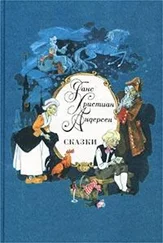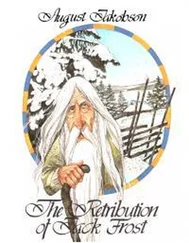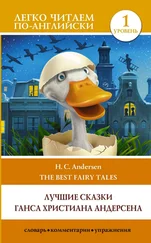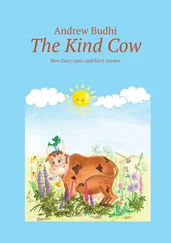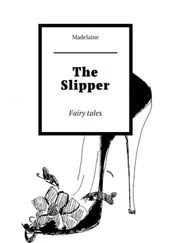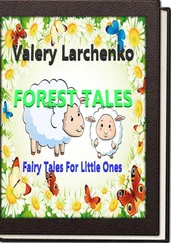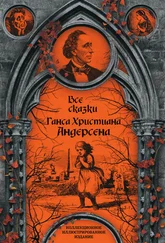Ганс Андерсен - Fairy Tales
Здесь есть возможность читать онлайн «Ганс Андерсен - Fairy Tales» весь текст электронной книги совершенно бесплатно (целиком полную версию без сокращений). В некоторых случаях можно слушать аудио, скачать через торрент в формате fb2 и присутствует краткое содержание. Жанр: Старинная литература, на английском языке. Описание произведения, (предисловие) а так же отзывы посетителей доступны на портале библиотеки ЛибКат.
- Название:Fairy Tales
- Автор:
- Жанр:
- Год:неизвестен
- ISBN:нет данных
- Рейтинг книги:4 / 5. Голосов: 1
-
Избранное:Добавить в избранное
- Отзывы:
-
Ваша оценка:
- 80
- 1
- 2
- 3
- 4
- 5
Fairy Tales: краткое содержание, описание и аннотация
Предлагаем к чтению аннотацию, описание, краткое содержание или предисловие (зависит от того, что написал сам автор книги «Fairy Tales»). Если вы не нашли необходимую информацию о книге — напишите в комментариях, мы постараемся отыскать её.
Fairy Tales — читать онлайн бесплатно полную книгу (весь текст) целиком
Ниже представлен текст книги, разбитый по страницам. Система сохранения места последней прочитанной страницы, позволяет с удобством читать онлайн бесплатно книгу «Fairy Tales», без необходимости каждый раз заново искать на чём Вы остановились. Поставьте закладку, и сможете в любой момент перейти на страницу, на которой закончили чтение.
Интервал:
Закладка:
“Welcome! Welcome!” each sunbeam sang and rang, and the flower rose over the snow into the world of light. The sunbeams caressed and kissed it so that it opened completely. It was white as the snow and adorned with green streaks. It bowed its head in joy and humility.
“Lovely flower!” the sunbeams sang. “How fresh and pure you are! You’re the first, you’re the only! You’re our love! You ring in summer across the land and towns. All the snow will melt! The cold winds are chased away! We will rule! Everything will turn green. Then you’ll have company—the lilacs, laburnum, and finally, roses. But you’re the first, so delicate and pure!”
It was a great pleasure. The flower felt as if the air sang to it, and the rays of light pierced into its leaves and stalk. It stood there so delicate and easy to break, and yet so vigorous with young beauty. With its white tunic and green ribbons it praised summer. But summer was still far away. Clouds hid the sun, and sharp winds blew the flower.
“You’ve come a little too early,” said the wind and weather. “We still have the power! You’ll feel it and put up with it. You should have stayed inside and not run out in your finery. It’s not time yet.”
It was biting cold. The following days didn’t bring a single sunbeam! It was the kind of weather such a little flower could freeze to death in. But it had more strength than it realized. It was strong in the joy and belief of the summer that had to come, the summer that was proclaimed with deep longing, and that was confirmed by the warm sunshine. So it stood with confidence in its white outfit in the white snow, bending its head when the snowflakes fell thick and heavily, and the icy winds blew over it.
“You’re going to break!” they said. “Wither and freeze. Why did you come out? Why did you let yourself be lured? The sun has fooled you! It serves you right, you little snowdrop, summer fool!”
“Summer fool!” repeated the snowdrop in the cold morning hours.
“Summer fool!” shouted some children, who came into the garden. “There’s one—so lovely and beautiful—the first and only one!”
These words did the flower a lot of good for they were words as warm as the sunbeams. In its joy, the flower didn’t even notice that it was being picked. It lay in a child’s hand and was kissed by a child’s mouth. It was brought into the warm living room, looked at with gentle eyes, and put in water, strengthening and reviving. The flower thought that all at once it was summer.
There was a daughter in the house, a lovely young girl. She had just been confirmed, and she had a dear friend who was also confirmed. He was studying for his livelihood. “He shall be my summer fool,” she said. She took the delicate flower and laid it in a piece of scented paper on which there were verses written. The verses started with summer fool and ended with summer fool, then “dear friend, be a winter fool!” She had teased him with summer. It was all in the poem, and it was sent as a letter. The flower was enclosed, and it was dark all around, as dark as when it lay inside the bulb. The flower went traveling, lay in a postbag, and was pressed and squeezed. It wasn’t at all comfortable, but this too came to an end.
The trip was over. The letter was opened and read by the dear friend. He was very pleased. He kissed the flower, and along with the verses around it, it was put into a drawer where there were other lovely letters, but none with flowers. It was the first and the only, as the sunbeams had called it, and that was delightful to think about.
And the flower had a long time to think about it. It thought while summer passed, and the long winter, and when it was summer again, the flower was brought out. But now the young man was not at all happy. He grasped the papers roughly and threw the verses aside so that the flower fell on the floor. It had become flat and withered, but that was no reason to throw it on the floor! But still it was better than being in the fire, where the verses and letters were burning up. What had happened? What happens so often. The flower had fooled him—it was a joke. The girl had fooled him—that was no joke. She had chosen another friend in midsummer.
In the morning the sun shone on the little flat pressed snowdrop, which looked as if it was painted on the floor. The maid was sweeping and picked it up and laid it in one of the books on the table because she thought it had fallen out as she was putting the room in order. And once again the snowdrop was lying amidst verses, but these were printed ones. They are more distinguished than written ones, or at least more is spent on them.
Years passed, and the book stood on the shelf. Then one day it was taken out, opened and read. It was a good book—the poems and songs of the Danish poet Ambrosius Stub, 2well worth knowing. And the man who was reading the book turned the page. “Why here’s a flower!” he said. “A snowdrop, a summer fool! It surely means something that it’s placed here. Poor Ambrosius Stub. He was a summer fool too, a poet fool! He was ahead of his time too, and because of that he felt sleet and sharp winds, lived by turns in the manor homes of Funen, 3like a flower in a vase, flower in a rhymed letter! Summer fool, winter fool, jokes and pranks; and yet the first and only, still the fresh youthful Danish poet! Yes, be a bookmark in this book, little snowdrop. You were placed there for a reason.”
And the snowdrop was placed in the book again, and felt both honored and pleased to know that it was a bookmark in that lovely songbook, and that he who first had sung and written about the snowdrop was a summer fool too and had been made a fool of in the winter. The flower understood it in his fashion, as we understand things in ours.
And that’s the tale about the snowdrop!
NOTES
1 This story is often called untranslatable because its point and premise rest on the meaning in Danish of the flower name sommergjæk. The archaic verb gjekke means to hoax or tease. The sommergjcek, therefore, teases about the hope of summer because it blooms in the winter. There is also a Danish custom of sending the first snowdrop enclosed in an unsigned letter.
2 Danish poet (1705-1758).
3 Funen is the third-largest island of Denmark; its major city is Odense.
THE SUNSHINE’S STORIES
“Now I’M GOING TO tell a story,” said the wind.
“No, allow me, it’s my turn,” said the rain. “You’ve stood by the corner long enough and blown off everything you could.”
“Is that the thanks I get,” said the wind, “for turning all those umbrellas inside out, in your honor? Actually breaking them, when people haven’t wanted to have anything to do with you?”
“I will tell a story,” said the sunshine. “Be quiet!” It was said with brilliance and majesty, so the wind lay down flat, but the rain shook the wind and said, “And we have to tolerate this! She always breaks in, this Madame Sunshine. We don’t want to listen! It’s not worth the trouble to listen.”
But the sunshine told this:
“A swan flew over the rolling sea. Its every feather shone like gold. One feather fell down on a big merchant ship that was gliding by at full sail. The feather fell into the curly hair of a young man, the supervisor of the wares. They called him ‘Supercargo.’ The feather from the bird of luck touched his forehead and became a pen in his hand. Soon he became a rich merchant who could buy spurs of gold and change gold plates to a noble’s shield. I’ve actually reflected myself in it,” said the sunshine.
“The swan flew further across a green meadow, where a little shepherd, a boy of seven, was lying in the shade of an old tree, the only one there. And in his flight the swan kissed one of the tree’s leaves. It fell into the boy’s hand, and the one leaf turned to three, then ten, and finally became a whole book. In it he read about the wonders of nature, about his mother tongue, and about faith and knowledge. At bedtime he lay the book under his head so that he wouldn’t forget what he had read, and the book led him to school, to the table of knowledge. I have read his name amongst the scholars,” said the sunshine.
Читать дальшеИнтервал:
Закладка:
Похожие книги на «Fairy Tales»
Представляем Вашему вниманию похожие книги на «Fairy Tales» списком для выбора. Мы отобрали схожую по названию и смыслу литературу в надежде предоставить читателям больше вариантов отыскать новые, интересные, ещё непрочитанные произведения.
Обсуждение, отзывы о книге «Fairy Tales» и просто собственные мнения читателей. Оставьте ваши комментарии, напишите, что Вы думаете о произведении, его смысле или главных героях. Укажите что конкретно понравилось, а что нет, и почему Вы так считаете.

![Ганс Андерсен - Ганс Чурбан[другой перевод]](/books/95480/gans-andersen-gans-churban-drugoj-perevod-thumb.webp)
